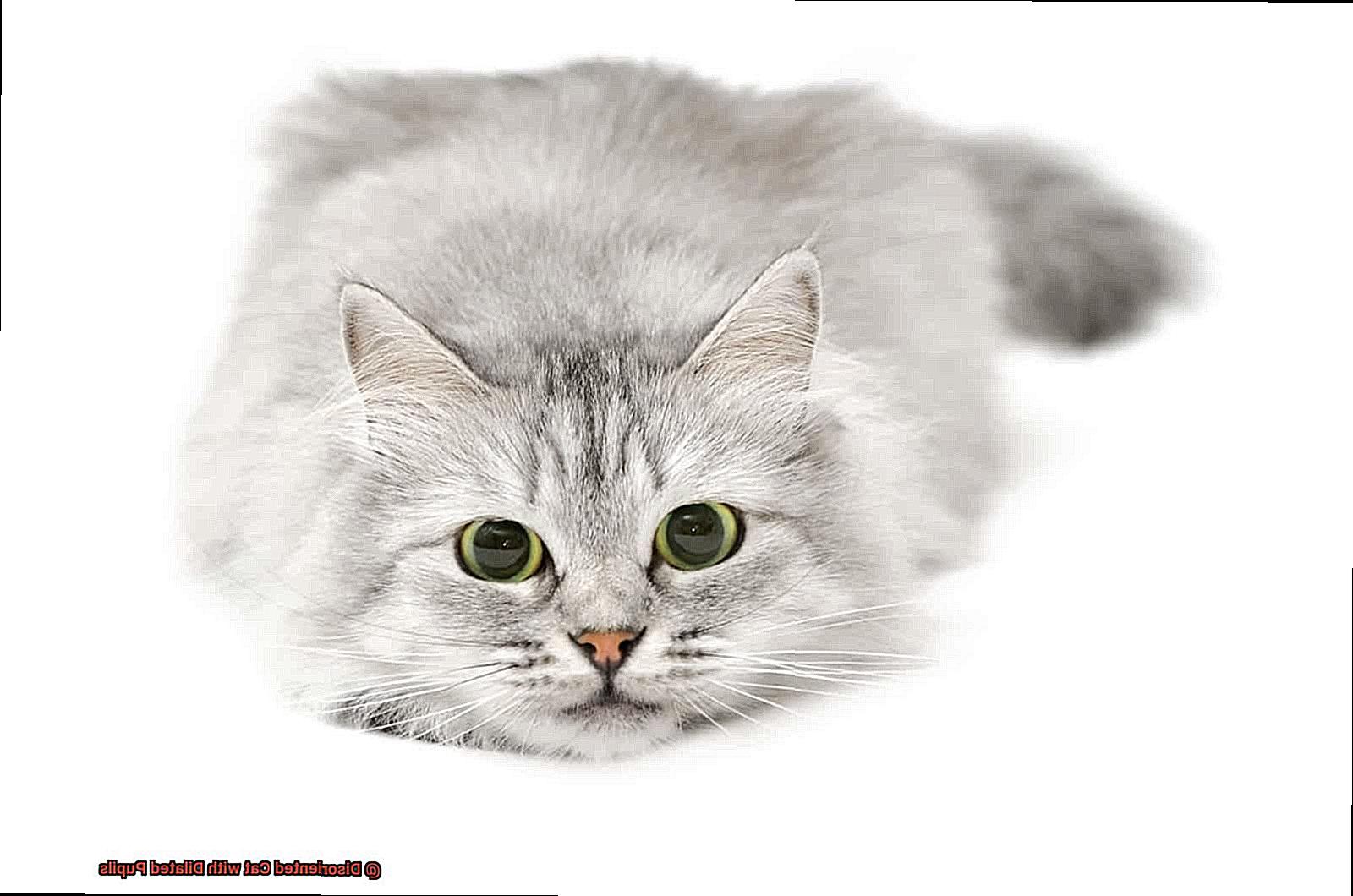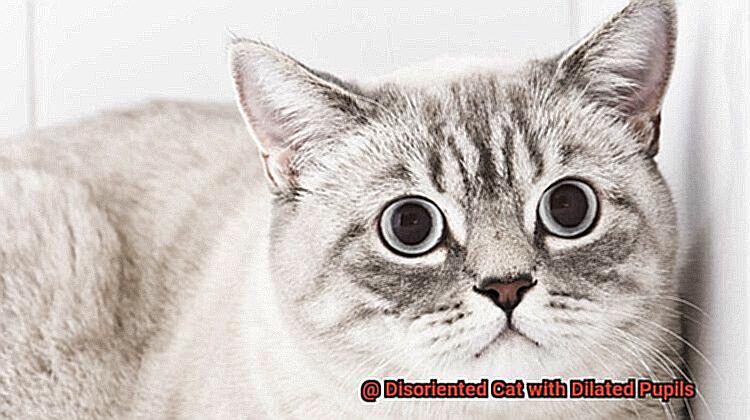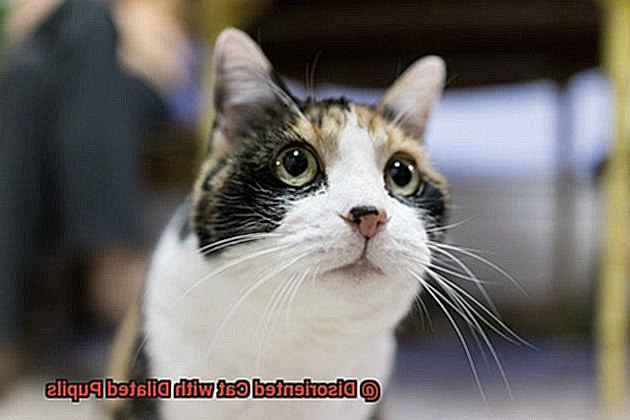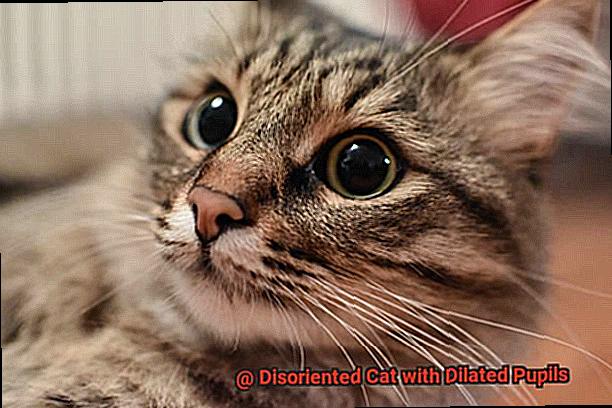As a cat owner, you’re used to your feline friend’s quirky behavior. But when you notice her stumbling around with dilated pupils and seeming disoriented, it can be alarming. Don’t ignore these symptoms – they could be indicators of a serious medical issue.
There are several possible reasons why your cat is struggling to navigate her usual surroundings. Head trauma, neurological disorders, or certain medications are some of the most common culprits. No matter the cause, it’s crucial to act quickly and get your cat the help she needs – especially if the symptoms persist.
In this article, we’ll delve into everything you need to know about a disoriented cat with dilated pupils. We’ll explore the symptoms and causes in detail so that you can better understand what your furry friend is going through – and how best to help her get back on her paws. Whether you’re a seasoned cat owner or a first-time pet parent, keep reading for vital information about this serious medical issue.
Causes of Disorientation and Dilated Pupils in Cats
If you’ve noticed your feline friend displaying disorientation with dilated pupils, it can be worrisome. These symptoms may indicate an underlying medical condition and require immediate attention. In this article, we’ll delve into the various root causes of disorientation and dilated pupils in cats.
Neurological Issues
These symptoms may indicate an underlying condition that requires immediate attention from a veterinary professional.
Concussions are a common neurological issue in cats that can lead to confusion and dilated pupils. These occur when the brain is shaken or jolted inside the skull, causing temporary disorientation. Along with dilated pupils, your cat may also exhibit lethargy, vomiting, and seizures.
Epilepsy is another neurological condition that can cause seizures and disorientation in cats. This disorder results from abnormal electrical activity in the brain, leading to recurring seizures. In addition to dilated pupils, your cat may also drool, lose consciousness, and experience muscle spasms.
Infections and tumors can also cause neurological issues in cats. Meningitis is an infection that causes inflammation of the brain and spinal cord, leading to confusion and dilated pupils. Brain tumors can affect your cat’s coordination and cause disorientation.
If you notice any unusual behavior or symptoms in your cat, such as disorientation or dilated pupils, seek veterinary care immediately. A professional diagnosis can help identify the underlying cause and ensure appropriate treatment for your furry friend. Remember, early intervention is key to maintaining your cat’s health and well-being.
In conclusion, while neurological issues can be concerning for cats, there are effective treatments available for many conditions. Don’t hesitate to seek veterinary care if you notice anything out of the ordinary with your beloved pet.
Toxicity
However, toxicity can be a potential threat to your cat’s well-being, causing disorientation and dilated pupils. But don’t worry, there are certain measures we can take to minimize the risk of exposure.

Household chemicals like cleaning products, insecticides, and antifreeze are extremely hazardous to cats if ingested or even inhaled. These toxins can cause seizures, disorientation, and dilated pupils. The best way to keep your cat safe is by storing these items out of reach of pets and seeking immediate veterinary care if ingestion or exposure occurs.
Plants too can be toxic to cats if ingested. Certain plants that are toxic to cats include lilies, azaleas, and tulips. It’s always best to err on the side of caution and keep these plants away from your pet.
Certain medications like acetaminophen and ibuprofen – both prescription and over-the-counter – can cause liver failure and disorientation in cats if ingested. To protect your cat, make sure all medications are stored out of reach of pets and only give medications prescribed by a veterinarian.
Lastly, certain foods like chocolate, grapes, and onions can be toxic to cats if ingested. These toxins can cause vomiting, diarrhea, and disorientation. As responsible pet owners, it’s essential to educate ourselves on the foods that are safe for cats to consume and always keep any potentially hazardous foods out of reach of pets.
In conclusion, toxicity is a serious issue for cats. As a responsible pet owner, it’s important to identify all potential hazards in the home or yard and take steps to minimize the risk of exposure.
Other Medical Conditions
But sometimes, even with the best care, cats can develop medical conditions that affect their behavior and well-being.
If you notice your cat acting disoriented and with dilated pupils, it’s important to consider other possible medical conditions that could be causing or contributing to these symptoms.
Neurological disorders
Neurological disorders are among the most common causes of dilated pupils and/or disorientation in cats.
Epilepsy, vestibular disease, meningitis, encephalitis, or brain tumors can all affect the brain, spinal cord, or nerves and lead to these symptoms. Depending on the severity of the disorder, your cat may also experience seizures, circling, head tilt, weakness, or changes in behavior.
Infectious diseases
Infectious diseases are another group of medical conditions that can affect cats’ eyes, brain, or nervous system. Feline immunodeficiency virus (FIV), feline leukemia virus (FeLV), toxoplasmosis, cryptococcosis, and distemper (in unvaccinated cats) are some examples.

These diseases can cause inflammation or damage to the organs or structures involved in sight and balance, leading to dilated pupils and/or disorientation. Other signs may include fever, lethargy, loss of appetite, weight loss, or respiratory problems.
Endocrine disorders
Endocrine disorders are yet another possibility that should not be overlooked. Cats have several glands that produce hormones that regulate various bodily functions. If these glands malfunction or produce too much or too little hormone, it can affect the cat’s health and behavior.
Diabetes mellitus, hyperthyroidism or hypothyroidism, Cushing’s disease or Addison’s disease are some endocrine disorders that may indirectly cause dilated pupils and/or disorientation by disrupting hormone levels. Other signs may include increased thirst, urination or appetite; weight changes; or skin and coat problems.
Finally, cardiovascular disorders can also affect cats’ brain and eyes and lead to dilated pupils and/or disorientation. Heart failure, blood clots, or anemia are some examples of such disorders that can reduce blood flow or oxygen supply to the brain. Other signs may include coughing, difficulty breathing, or pale gums.
Signs of Disorientation and Dilated Pupils in Cats
Two common symptoms to watch out for are disorientation and dilated pupils, which could indicate an underlying health issue.
Disorientation can manifest as your cat appearing unsteady on their feet or having difficulty walking or jumping. They may also seem unsure of their surroundings. Dilated pupils, on the other hand, can indicate pain, fear, or excitement.
When these two symptoms occur simultaneously, it’s crucial to act fast and seek veterinary care immediately. Disorientation and dilated pupils can be red flags for neurological problems such as head trauma, tumors, or seizures. Certain toxins or medications can also cause these symptoms.
It’s worth mentioning that dilated pupils alone aren’t always concerning. In fact, cats’ pupils naturally expand in low light conditions to let in more light into their eyes. However, if your cat’s pupils remain dilated in well-lit areas or are accompanied by other concerning symptoms, it’s best to seek professional advice.
Your veterinarian will conduct a thorough examination and may order diagnostic tests such as blood work or imaging to determine the root cause of the symptoms. Early detection and treatment can make a significant difference in your cat’s health and quality of life.
If you notice your cat exhibiting signs of disorientation and dilated pupils, don’t hesitate to contact your veterinarian.
Treatment for Disorientation and Dilated Pupils in Cats
Rest assured that there are treatment options available to help your cat feel better.
The first step in treating these symptoms is to identify the underlying cause. If the cause is medical, such as an infection or injury, your vet may prescribe medication or antibiotics to address the issue. On the other hand, if it’s neurological, such as a brain tumor or seizure disorder, your vet may recommend anti-seizure medication or other treatments to manage the condition and alleviate symptoms.
While undergoing treatment, it’s crucial to make sure your cat is receiving proper nutrition and hydration. This may involve providing supportive care like fluids and nutritional supplements to aid in their recovery.
In more severe cases, hospitalization may be necessary for close monitoring and administration of treatments. It’s essential to closely follow your vet’s instructions and provide any necessary follow-up care to ensure your cat makes a full recovery.
Remember, quick action and seeking veterinary care immediately is crucial for ensuring your cat’s health and wellbeing. Don’t hesitate to reach out to your vet if you notice any concerning symptoms in your furry friend.
Prevention of Disorientation and Dilated Pupils in Cats
Disorientation and dilated pupils are among the most worrying symptoms that cats can experience. However, did you know that there are proactive steps you can take to prevent these concerning symptoms from happening? By implementing a healthy lifestyle for your feline friend, you can help keep them free from disorientation and dilated pupils.
The first and foremost step to preventing these symptoms is ensuring that your kitty receives regular veterinary check-ups. These check-ups can help identify any underlying medical conditions that may be contributing to your cat’s disorientation or dilated pupils. Early detection and treatment of these conditions can prevent them from progressing and causing further health concerns.
A healthy diet plays an essential role in keeping your cat happy and healthy. A well-balanced diet with high protein and low carbohydrates can help support your cat’s overall well-being. Additionally, providing enough exercise and mental stimulation can help prevent boredom and reduce stress, which are both factors that can lead to disorientation and dilated pupils.

Keeping your cat’s environment safe is also critical in preventing disorientation and dilated pupils. This includes keeping toxic substances out of reach, providing appropriate scratching posts and toys, and ensuring that your cat has access to clean water at all times. Regular cleaning of your cat’s litter box can also help prevent bacterial infections.
In some cases, certain medications or treatments may be necessary to prevent disorientation and dilated pupils in cats. Your veterinarian can recommend appropriate treatments based on the underlying cause of your cat’s symptoms.
By taking a proactive approach to your cat’s health and well-being, you can help ensure that they stay happy, healthy, and free from these concerning symptoms. With a combination of proper nutrition, regular veterinary check-ups, a safe environment, and appropriate medical care when necessary, you can help prevent disorientation and dilated pupils in cats.
How to Tell if Your Cat Has an Underlying Medical Condition Causing Dilation of the Pupils
One thing that can be cause for concern is if you notice that your cat’s pupils are dilated. Dilated pupils in cats can be a sign of an underlying medical condition, and it’s important to know how to recognize the symptoms and what to do next.
Recognize the Signs
If you notice that your cat’s pupils are constantly dilated or remain dilated for an extended period of time, this could be a sign of an underlying medical condition. Additionally, if your cat seems disoriented or is experiencing seizures, this could also be a cause for concern. It’s important to note that some medications can also cause dilated pupils in cats, so be sure to read the labels and discuss any concerns with your vet.
Visit the Vet
If you notice any of the above symptoms, it’s important to take your cat to the vet as soon as possible. Your vet will perform a thorough examination and may also perform blood work or other diagnostic tests to determine if there is an underlying medical condition causing the dilation of the pupils. During the examination, your vet may also check for any abnormalities in your cat’s neurological function.
Understand Possible Medical Conditions
There are several medical conditions that can cause dilation of the pupils in cats, including glaucoma, hypertension, hyperthyroidism, and even cancer. If left untreated, these conditions can cause serious health problems for your cat, so it’s important to seek treatment as soon as possible.
Treatment Options
The treatment options for dilated pupils will depend on the underlying cause of the issue. Your vet may prescribe medication or recommend surgery if necessary. In some cases, such as when stress or anxiety is the cause, behavior modification techniques may be recommended.
Prevention and Management

Preventing medical conditions that can cause dilated pupils in cats is not always possible, but keeping up with routine veterinary care and monitoring your cat’s behavior and symptoms can help catch any issues early on. Additionally, managing your cat’s stress levels and providing a comfortable and calming environment can also help prevent anxiety-related dilated pupils.
In conclusion, dilated pupils in cats should not be ignored. If you notice any symptoms or changes in your cat’s behavior, it’s important to seek veterinary care right away.
When to See a Veterinarian for Disoriented Cat with Dilated Pupils
Therefore, it’s crucial to be vigilant for any changes in their behavior or health. If you notice that your cat appears disoriented and has dilated pupils, it’s essential to seek veterinary attention right away.
Dilated pupils and confusion in cats can be caused by various factors such as neurological issues, toxic exposure, infections, head trauma, or even cancer. In some cases, these symptoms could indicate a seizure disorder or a life-threatening condition such as heatstroke or poisoning.
Cats are experts at hiding their pain and discomfort, so it’s essential to monitor their behavior closely and take note of any other symptoms they may be experiencing, such as vomiting or loss of appetite. If your cat is exhibiting disorientation and dilated pupils accompanied by lethargy or weakness, it’s crucial to seek immediate veterinary attention. Delaying treatment could lead to permanent damage or even death.
It’s important to remember that early detection and treatment of health issues can make a significant difference in your cat’s overall health and well-being. Therefore, don’t hesitate to take your cat to the vet if you notice anything out of the ordinary.
So, if you notice that your cat appears disoriented and has dilated pupils, it’s vital to seek veterinary attention promptly. Your veterinarian can diagnose any underlying medical conditions and provide necessary treatment.
hOC9DH_pgzQ” >
Conclusion
As a devoted cat owner, it’s understandable to feel anxious when your feline friend is disoriented and has dilated pupils. However, ignoring these signs can have serious consequences. It’s imperative to take action immediately and seek veterinary care as soon as possible.
There are several reasons why your cat may be experiencing disorientation and dilated pupils. Neurological disorders, head trauma, or certain medications could all be culprits. Additionally, household chemicals, plants or medications toxicity can also lead to confusion and dilation of the pupils. Infections or illnesses such as FIP, FeLV, or FIV can affect the nervous system and lead to neurological symptoms in cats.
Ignoring these symptoms could lead to further complications for your furry friend. Therefore, it’s crucial to act quickly and get professional help for your pet. Your veterinarian will diagnose the underlying cause of your cat’s symptoms and recommend appropriate treatment options.
Prevention is always better than cure. While some medical conditions that cause dilated pupils in cats may not be preventable, keeping up with routine veterinary care and monitoring your cat’s behavior can help catch any issues early on. Early detection of health issues can significantly improve your cat’s overall health and well-being.
If you notice any unusual behavior or symptoms in your cat – especially disorientation with dilated pupils – seek veterinary care immediately.







